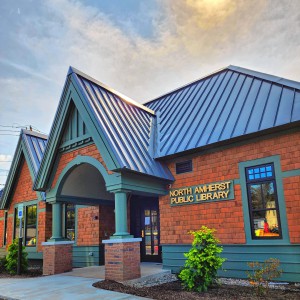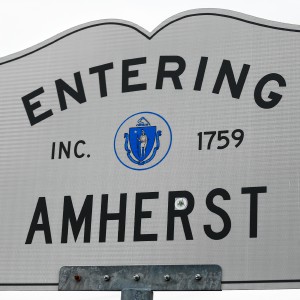Northampton schools eye ‘science of reading’ model, backed by $323K in grants
| Published: 05-14-2023 4:25 PM |
NORTHAMPTON — At Ryan Road Elementary School, students in Diana Ramsden’s first grade class work on reading and writing using a mixture of phonics lessons already included in the school’s reading curriculum and new lessons being piloted from one of two programs the district is considering after receiving two grants totaling more than $300,000.
As part of the lesson, one of the students, Azalea Bossie, points to a series of cards on a board to help sound out different vowel combinations — helping show how the “ou” in “soup” is pronounced differently from the “ou” in “trout,” but sounds similar to the “ue” in “rescue.”
Later on in the lesson, Ramsden displays on the projector several “nonsense words” that you might find in a Lewis Carroll novel, words like “mapnet,” “ludkey,” “bignip,” and “heblet.” Students sound them out, breaking them up into syllables, before then applying the technique to read real words like “cobweb” and “fungus.”
The Northampton Public School district is looking to update its K-5 elementary school literacy program, joining a nationwide conversation about how to improve reading in students through techniques collectively dubbed “the science of reading.”
The district received a $169,200 Evidence-Based Practice Grant from the state’s Department of Elementary and Secondary Education in April, a competitive grant for which more than 80 school districts in Massachusetts applied. That grant came on the heels of another $154,000 grant from the federal government called the Accelerated Literacy Learning through High-Quality Instructional Materials.
Roxanne Dorrie, director of curriculum and instruction for the district, said the grant funding would be used on new reading materials for students as well as for training teachers on how to use the new materials, after finding that current reading programs in the district’s elementary schools were not effective for students in special education or who were English-language learner (ELL) students.
“It’s part of the renewal process to continually update curriculum and see if we have a need for an update. And the first thing we did was look at our district data,” Dorrie said. “The data we’re getting on students and their progress [in reading] sort of begs the question of is our classroom program meeting the needs of all students.”
Inconsistencies in reading levels for students are hardly unique to Northampton. According to the U.S. Department of Education’s most recent assessment in 2022, only 33% of fourth grade students nationwide meet the department’s standards for being considered proficient in reading, a continuous decline since 2017. In Massachusetts, the numbers are slightly better, with 43% of students being considered proficient, although that number has declined over the past five years.
Article continues after...
Yesterday's Most Read Articles
 Northampton bans auto dealerships near downtown; zone change won’t affect Volvo operation on King Street
Northampton bans auto dealerships near downtown; zone change won’t affect Volvo operation on King Street
 Proposed Hatfield pickleball/tennis building raising eyebrows
Proposed Hatfield pickleball/tennis building raising eyebrows
 South Hadley man killed in I-91 crash
South Hadley man killed in I-91 crash
 ‘Home away from home’: North Amherst Library officially dedicated, as anonymous donor of $1.7M revealed
‘Home away from home’: North Amherst Library officially dedicated, as anonymous donor of $1.7M revealed
 Police respond to alcohol-fueled incidents in Amherst
Police respond to alcohol-fueled incidents in Amherst
 Public gets a look at progress on Northampton Resilience Hub
Public gets a look at progress on Northampton Resilience Hub
In order to remedy the situation, schools are pivoting toward an educational approach known as the science of reading, which emphasizes aspects such as phonics, breaking down words by syllables and studying the sounds different vowel combinations make. The science of reading method has already been implemented in the neighboring Easthampton school district.
In Northampton, the district currently uses what is known as a “whole language” approach to literacy for K-5, teaching children to read by recognizing words as whole pieces of language, rather than emphasizing the breaking down of words and studying their phonetic makeup, although some phonics-based instruction is still used in the present curriculum.
“We aren’t born to read — we’re born to speak. Reading is a code that can be taught,” Dorrie said. “I would like to see all Northampton students be able to read by third grade. What happens when they hit third grade and they’re really far behind, it’s called the ‘Matthews Effect’: the poor stay poor and the rich get richer.”
Ryan Road Principal Karen Albano said she was supportive of the new reading measures being introduced, but that any new literacy program would have to be changed to suit what works for the district.
“It may be necessary to tweak some of the lessons, as long as it’s done across all schools and all classrooms,” Albano said. “I’m most driven by what educators are given for feedback.”
At a meeting held at Northampton High School’s library last Wednesday, K-5 teachers in the district discussed which literacy program they wanted to adopt, having narrowed down the number suitable for the district to two. Each program emphasizes the science of reading approach, although they contain different instructional materials to use with students.
“We have to make sure we’re building equity for all of our students,” Rachel Nicholas, the literacy coach for K-5 instruction in the district, said. “One of the major issues in this district is the gap between our ELL students, our special education students and other students, and the point of a lot of these high-quality instructional materials, and this is a shift for me too, is to make sure that every child is exposed with the same level of quality instruction.”
According to Bridget Pelis, another first grade teacher at Ryan Road, the science of reading approaches already used in the district have been effective in bridging that gap in the classroom.
“Our phonics and our phonemic awareness programs are really supporting all of our children,” Pelis said. “At Ryan Road, we have a cohort of a lot of English language learners and other different types of learners, and they’re being really successful.”
Alexander MacDougall can be reached at amacdougall@gazettenet.com.

 State Senate budget funds free community college for all
State Senate budget funds free community college for all ‘We can just be who we are’: Thousands show support for LGBTQ community at Hampshire Pride
‘We can just be who we are’: Thousands show support for LGBTQ community at Hampshire Pride Doors open at Tilton Library’s temporary home at South Deerfield Congregational Church
Doors open at Tilton Library’s temporary home at South Deerfield Congregational Church Area property deed transfers, May 2
Area property deed transfers, May 2
